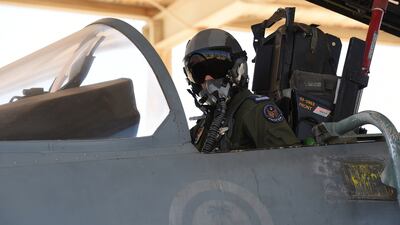The Saudi-led coalition carried out a new wave of air strikes in Yemen early on Sunday, Saudi media said.
Its response was part of a stepped up air campaign to suppress Houthi drone and missile attacks against civilian infrastructure in the kingdom, the reports said.
Sanaa, Yemen’s rebel-held capital, was one target of the raids, according to Saudi broadcaster Al Ekhbariya TV. It tweeted that “the start of air strikes on Houthi camps and strongholds in Sanaa” occurred at about midnight.
The attacks began shortly after the Iran-backed Houthis announced a three-day truce and offered peace talks on condition that the Saudi Arabians remove “foreign forces” and stop their air strikes and blockade of Yemen.
Saudi Arabia has the largest air force in the Middle East, with an inventory of more than 360 combat aircraft, including about 200 F-15 fighter-bombers.
Rebel reports of casualties could not be independently confirmed.
The Houthi truce followed a wave of drone and missile attacks on targets in the kingdom on Friday, including an oil depot near Jeddah.
On Saturday, Brig Gen Turki Al Malki, spokesman for the coalition, said the overnight strikes’ target was the “sources of threat” to the kingdom, the state-run Saudi Press Agency reported.
He said the coalition had intercepted and destroyed two explosives-laden drones that were launched from Houthi-held civilian oil facilities in Hodeidah.
The US, EU and the Arab League condemned the attacks.
In the region, the Egyptian Ministry of Foreign Affairs denounced “terrorist attacks targeting the kingdom’s territory and its vital and civilian facilities and installations,” including water infrastructure.
The UAE Ministry of Foreign Affairs and International Co-operation called the attacks a “challenge to the international community and the efforts made to end the Yemeni crisis as well as a disregard for all international laws and norms”.
Palestinian President Mahmoud Abbas called the attacks “criminal” and pledged support to Saudi Arabia to stop “terrorist attacks.”
Israeli Prime Minister Naftali Bennett expressed his country’s “sorrow” for the kingdom and said the attacks were “further proof that Iran’s regional aggression knows no bounds”.
Iran’s support for the Houthis, which the UN has documented and verified, includes the provision of suicide drones, ballistic and cruise missiles. This point was highlighted by Saudi Arabia’s energy ministry last week.
“The kingdom stresses the importance of the international community being aware of the danger of Iran continuing to provide the terrorist Houthi militias with ballistic missile and advanced drone technologies,” the ministry said.
The Houthis have turned down an invitation to peace talks in Riyadh, scheduled for the coming days, to be hosted by the six-nation Gulf Co-operation Council.

